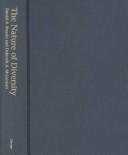| Listing 1 - 3 of 3 |
Sort by
|
Periodical
Abstract | Keywords | Export | Availability | Bookmark
 Loading...
Loading...Choose an application
- Reference Manager
- EndNote
- RefWorks (Direct export to RefWorks)
Book
ISBN: 0520976452 Year: 2021 Publisher: Oakland, California : University of California Press,
Abstract | Keywords | Export | Availability | Bookmark
 Loading...
Loading...Choose an application
- Reference Manager
- EndNote
- RefWorks (Direct export to RefWorks)
As climate disruption intensifies the world over, Californians are finding solutions across a diversity of communities and landscapes. Though climate change is a global existential threat, we cannot wait for nation-states to solve the problem when there are actions we can take now to protect our own communities. In Climate Stewardship: Taking Collective Action to Protect California, readers are invited on a journey to discover that all life is interconnected and shaped by climate and to learn how communities can help tackle climate change. Climate Stewardship shares stories from everyday people and shows how their actions enhance the resilience of communities and ecosystems across ten distinct bioregions. Climate science that justifies these actions is woven throughout, making it easy to learn about Earth's complex systems. The authors interpret and communicate these stories in a way that is enjoyable, inspiring, and even amusing. California is uniquely positioned to develop and implement novel solutions to widespread climate challenges, owing to the state's remarkable biogeographic diversity and robust public science programs. Produced in collaboration with the UC California Naturalist Program, Climate Stewardship focuses on regenerative approaches to energy, agriculture, and land and water use across forested, agricultural, and urban landscapes. The authors' hopeful and encouraging tone aims to help readers develop a sense that they, too, can act now to make meaningful change in their communities.
Climatic changes --- California ecosystem management. --- Los Angeles. --- San Francisco. --- agriculture. --- carbon sequestration. --- climate change action. --- community science. --- desert. --- educational initiatives. --- environmental education. --- for classes. --- how to guide. --- textbooks. --- water supply. --- wildfire.

ISBN: 0226075893 0226075907 0226922472 9780226922478 Year: 2002 Publisher: Chicago : University of Chicago Press,
Abstract | Keywords | Export | Availability | Bookmark
 Loading...
Loading...Choose an application
- Reference Manager
- EndNote
- RefWorks (Direct export to RefWorks)
All living things on earth-from individual species to entire ecosystems-have evolved through time, and evolution is the acknowledged framework of modern biology. Yet many areas of biology have moved from a focus on evolution to much narrower perspectives. Daniel R. Brooks and Deborah A. McLennan argue that it is impossible to comprehend the nature of life on earth unless evolution-the history of organisms-is restored to a central position in research. They demonstrate how the phylogenetic approach can be integrated with ecological and behavioral studies to produce a richer and more complete picture of evolution. Clearly setting out the conceptual, methodological, and empirical foundations of their research program, Brooks and McLennan show how scientists can use it to unravel the evolutionary history of virtually any characteristic of any living thing, from behaviors to ecosystems. They illustrate and test their approach with examples drawn from a wide variety of species and habitats. The Nature of Diversity provides a powerful new tool for understanding, documenting, and preserving the world's biodiversity. It is an essential book for biologists working in evolution, ecology, behavior, conservation, and systematics. The argument in The Nature of Diversity greatly expands upon and refines the arguments made in the authors' previous book Phylogeny, Ecology, and Behavior.
Biodiversity. --- Phylogeny. --- Adaptation (Biology) --- Adaptation (Biology). --- Environment --- Animal phylogeny --- Animals --- Phylogenetics --- Phylogeny (Zoology) --- Biological diversification --- Biological diversity --- Biotic diversity --- Diversification, Biological --- Diversity, Biological --- Phylogeny --- Biology --- Self-organizing systems --- Variation (Biology) --- Biological fitness --- Genetics --- Evolution (Biology) --- Biocomplexity --- Ecological heterogeneity --- Numbers of species --- Biodiversity --- Environmental adaptation --- Adaptation, Environmental --- diversity, discovery, zoology, animals, species, ecosystems, evolution, biology, academic, scholarly, education, meaning of life, human nature, organisms, phylogenetic, ecology, ecological, behavioral, studies, research, habitat, biodiversity, conservation, environment, environmental, adaptation, geography, community, science, scientific, historical, history, space time continuum, methodology.
| Listing 1 - 3 of 3 |
Sort by
|

 Search
Search Feedback
Feedback About UniCat
About UniCat  Help
Help News
News